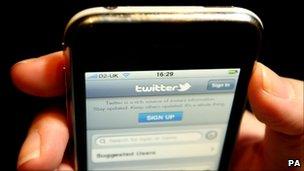'Twitter messages not private' rules PCC
- Published

The PCC said it was increasingly being asked to make judgements about the use of social media
Material that is published on Twitter should be considered public and can be published, the Press Complaints Commission (PCC) has ruled.
The decision follows a complaint by a Department of Transport official that the use of her tweets by newspapers constituted an invasion of privacy.
Sarah Baskerville complained to the PCC about articles in the Daily Mail and Independent on Sunday.
The messages included remarks about being hungover at work.
She complained that this information was private and was only meant to be seen by her 700 followers.
Ms Baskerville said she had a clear disclaimer that the views expressed by her on Twitter were personal and not representative of her employer.
The disclaimer currently reads, external: "Scottish & Sober-ish.. Civil Servant. This is my personal account, personal views. Nothing to do with my employers. What I retweet I may or may not agree with."
Ms Baskerville complained to the press regulator, arguing that she could have a "reasonable expectation" of privacy and that the reporting was misleading.
But the PCC said the potential audience for Ms Baskerville's tweets was much wider than her followers, because each message could be forwarded by others, known as retweeting.
It also agreed with the newspapers' argument that Twitter was publicly accessible and that the complainant had not taken steps to restrict access to her messages and was not publishing material anonymously.
As a result, the commission ruled that the articles did not constitute a breach of privacy.
"This is an important ruling by the commission," said PCC director Stephen Abell.
"As more and more people make use of such social media to publish material related to their lives, the commission is increasingly being asked to make judgements about what can legitimately be described as private information.
"In this case, the commission decided that republication of material by national newspapers, even though it was originally intended for a smaller audience, did not constitute a privacy intrusion."
- Published3 February 2011
- Published20 December 2010